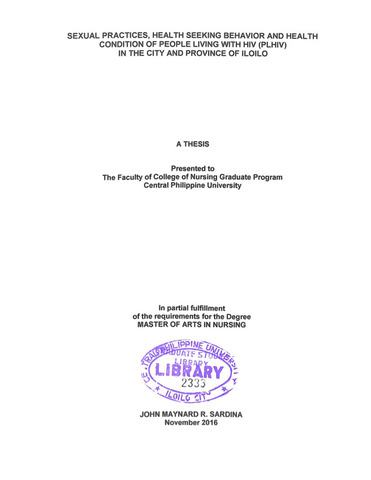Sexual practices, health seeking behavior and health condition of people living with HIV (PLHIV) in the city and province of Iloilo

Page views
710Дата
2016Автор
Thesis Adviser
Defense Panel Chair
Share
Metadata
Показать полную информацию
Аннотации
This study was conducted to determine the Sexual Practices, Health Seeking Behavior and Health Condition of People Living with HIV (PLHIV) in the City and Province of Iloilo. Specifically, this study aimed to determine: the characteristics of people living with HIV in terms of age, educational attainment, income, civil status and occupational status; the sexual practices; the health-seeking behavior; the health condition; the relationship between the characteristics of people living with HIV in terms of age, educational attainment, income, civil status and occupational status and their sexual practices; the relationship between characteristics of people living with HIV and their health-seeking behavior; the relationship between characteristics of people living with HIV and their health condition; the relationship between sexual practices and health condition; and the relationship between health-seeking behavior and health condition of people living with HIV.
This is a descriptive-relational study that utilized a one shot survey design. The respondents of this study were 31 HIV positive persons purposively chosen and identified by the research assistant who were willingly submitted themselves for interview. Thirty participants were included in the quantitative study and one of them was taken as the participants for the case study. Another respondent who was not included in the qualitative study was taken as a participant for the qualitative study. Data were collected through a personal interview by trained research assistant and the researcher was the one who collected the data in the two-case study. Data were encoded and processed using Statistical Package for Social Science (SPSS) software, version 20.
Majority of the respondents were twenty-six years old and above, single, had finished or reached college education, unemployed and those working had an estimated monthly income of less than 10,000.
All of the respondents had unsafe sexual practices. About eight for every ten respondents had high risk sexual practices which is four times higher than the proportion of respondents practiced low risk sexual practices.
Majority of the respondents had good promotive, preventive and treatment/curative and rehabilitative and overall health seeking behavior.
In terms of health condition, the proportion of respondents that had unsatisfactory physiologic/physical health condition was about six times higher compared to the proportion of respondents that had satisfactory physiologic/physical health condition. The proportion of respondents who had unsatisfactory emotional health condition was about thirty times higher than the proportion of those with satisfactory emotional health condition. On the other hand, proportion of respondents with satisfactory socio-cultural health condition was five times higher than the proportion of those with unsatisfactory socio-cultural health condition. Overall, proportion of respondents who had unsatisfactory overall health condition was five times higher compared to the proportion of those with satisfactory overall health condition.
The relationship analysis revealed a relationship between the respondents' sexual practices and their characteristics particularly, age, civil status, educational attainment, and occupational status. Monthly family income, however was not found to be related to influence the sexual practices.
Promotive health-seeking behavior was not related with age, civil status, educational attainment, estimated monthly family income and occupational status. In contrast, Preventive health-seeking behavior were found to be related to age, civil status, highest educational attainment and occupational status. Only estimated monthly family income was not related to preventive health-seeking behavior. Age, educational attainment, civil status, and estimated monthly family income were also found to be related with Treatment/Curative health seeking behavior but Occupational status was not. Respondent’s age, civil status, estimated monthly family income and occupational status were also found to be related to their rehabilitative health-seeking behavior. Educational attainment of the respondents was not related to their rehabilitative health seeking behavior. Age, civil status and occupational status were related to their overall health-seeking behavior but estimate monthly family income was not related.
Physical/Physiologic condition was related with civil status but age, highest educational attainment, estimated monthly family income and occupational status was not. Emotional health condition is related to age and highest educational attainment. On the other hand, respondents’ civil status, estimated monthly family income and occupational status were not related to their emotional health condition. Socio-Cultural health Condition is related to age, civil status, and estimated monthly family income but respondents’ highest educational attainment and occupational status was not related to their socio-cultural health condition. Age, civil status, estimated monthly family income and occupational status of the respondents were related to their overall health condition but highest educational attainment of respondents was not related to their overall health condition.
There is a relationship between sexual practices and health condition. In contrast, health-seeking behavior was not related to their health condition.
Описание
Abstract only
Suggested Citation
Sardina, J. M. R. (2016). Sexual practices, health seeking behavior and health condition of people living with HIV (PLHIV) in the city and province of Iloilo (Unpublished Master's thesis). Central Philippine University, Jaro, Iloilo City.
Type
ThesisТематика
Keywords
Department
School of Graduate StudiesDegree
Master of Arts in NursingShelf Location
GSL Theses 610.73072 Sa72
Physical Description
x, 137 leaves


